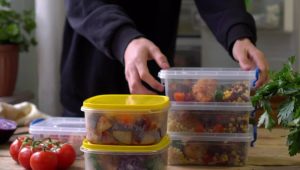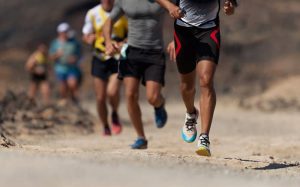Healthy Eating Tips for FIFO Workers
Eating healthy is always ideal but difficult to do, especially as a Fly In Fly Out (FIFO) worker. One would think that it’s easy to stay fit in industries like mining, construction, and oil. In reality, FIFO workers have a higher risk of becoming overweight or even obese compared to non-FIFO counterparts.
A small WA study by Edith Cowan University showed that 83% of FIFO workers at a particular rural mine site were overweight. Granted, this study only involved 35 men and was published seven years ago, but it is still very much relevant to this day.
The Australasian Mine Safety Journal states that FIFO workers’ poor health can be attributed to various factors, including work stress and fatigue. Unfortunately, their food exacerbates the situation since most workers consume high amounts of fat, sugar, and salt when at camp. While delicious and fun to eat, these foods can quickly lead to poor eating habits.
If you are a FIFO worker, it is time to make better food choices. Here are some of the best tips to eat good food to stay healthy:
1. Prepare Your Meals Beforehand
It’s time-consuming, and a bit of a challenge for some, but meal prep is essential before you fly out. Preparing what you will eat before you go to the camp involves estimating the amount of food you need to take with you. Sure, some foods are readily available for you to consume at the worksite; however, you need to be aware that they are often unhealthy options.
To make the task a little bit easier, you can create your meal plan, which you should follow. This will help you avoid any temptation on the site. Use the freezer and fridge at camp to store your food. You can keep it simpler by cooking meats at home. Make sure to wrap them in foil and put them in the freezer. Silicone pouches are the best options to secure premade meals, avoiding any spillage in your gear.
Before you head off, take your meal prep tools with you, such as small smoothie blenders, mason jars, an instant pot, and a food scale. If you have a problem sticking to your meal plan, you may want to download an app that will allow you to track what you’re eating. You will immediately know if you are eating more calories than required.
2. Eat This, Not That
Always be mindful about what you eat. It’s easy to say that you will follow a diet, but it’s difficult to achieve. The moment you walk into the site, you see trays of salads and fruits that appear to be healthy options. But then again, you will find sugary pastries, desserts, slices of bacon, hash browns, and red meats, which may make your mouth water.
What can you eat instead? We have better, healthier ideas:
- Start the day with fibrous food rather than bacon and other junk foods.
- Stick to the salad bar, not the dessert bar.
- Choose sandwiches or wraps with boiled eggs or salads.
- Even though greens are often unappealing for some people, they are heavy on the stomach, causing them to eat less.
- By greens, we mean veggies and not creamy potato bake or hot chips. So, fill your plate with these first before you take some meat.
- If you need some snacks, pick fruit or yoghurt, not high-fat crackers.
Many camps offer a lot of pasta, bread, and other carbs. While they are sources of energy, consuming them will lead to a crash during the middle of the day. That means you will have a tough time concentrating and even feel a strong urge to take a nap. Instead of these carbs, pick a healthier option, such as wholemeal or brown bread. They are very effective in giving you energy without worrying about the sugar crash later.
Craving sugar is a common issue with FIFO workers, particularly those who have night shift schedules. But as mentioned, sugary foods are the worst choices in maintaining mental alertness. That’s why it is vital to stay away from sugar as much as you possibly can.
Even if you eat healthy foods, you should still be careful with your portions. Eating too much can cause you to feel sick. As much as possible, limit what you put on your plate to the same size as your fist.
3. Drink Water, Lots of It
You’re not hungry; you’re just bored – or thirsty. Every FIFO worker knows the importance of staying hydrated. Unfortunately, not everyone likes to grab a glass of water. Hydration is essential in improving your mood, performance, focus, and energy. It’s also beneficial to your skin health, which is often a problem for several FIFO workers who stay for hours under the sun. Drink enough, and don’t forget to slap some sunscreen on your skin throughout the day.
Dehydration is terrible when you are in a remote area. Drink water whenever possible but don’t wait for your throat to become so dry. When this happens, your brain is already suffering from reduced blood flow, which slows down the oxygen that your brain cells require. That’s why you tend to lack energy and feel easily tired when you don’t drink water.
Just like with food, some drinks should be avoided. A recent study showed that many miners and others in the FIFO sector have trouble sleeping. One cause is their hazardous alcohol consumption. Some people think that alcohol is a good way to help them sleep. However, it has detrimental effects on a person’s sleeping pattern. While these drinks may knock you out after a bottle or two, you will eventually find it hard to stay asleep once the effect wears off.
Drinking beers and the like is often seen as a way to socialise, and it’s one of the activities that many FIFO workers look forward to. However, it’s not recommended, mainly because it causes dehydration.
Another drink that you should avoid is coffee or any caffeinated drink like tea and sports drink. Just like alcohol, these drinks cause dehydration. If you are already having trouble sleeping, it makes sense not to consume caffeinated drinks too close to bedtime.
To ensure you don’t dehydrate yourself, keep a hydration backpack close. Wear it if you can. It’s the easiest way to store and consume fluids that you will need throughout the day.
4. Stay Fit
Are you thinking about trimming down? If you see a pudge that won’t budge, it’s time to reconsider your diet and your daily activities. People have an incorrect view of FIFO workers, thinking they are generally on their feet for hours. In reality, many have sedentary lifestyles.
One way to combat inactivity is to use a pedometer, which is useful in telling you the number of steps you take in a day. It’s recommended that you achieve at least 10,000 steps to stay fit. This may look impossible, but it is the average number that will help you maintain a healthy weight.
It’s also a good idea to exercise for at least 30 minutes every day. Experts advise doing moderate-intensity exercises daily, such as brisk walking, riding a bike, playing tennis, and dancing (if you can). These days, many job sites have their gym where workers can exercise during their free time. Instead of drinking with your buddies, snacking, or just lazing out, grab some dumbbells, do some weightlifting, or run on the treadmill. These exercises will keep your blood flowing, help you lose weight, and maintain your health.
Eating healthy and staying fit will benefit FIFO workers at present and in the long term. A healthy diet helps improve your energy levels, sleep quality, digestion, and work performance. When you have an active lifestyle and eat the right foods, it’s easier to achieve a healthy weight and reduce the risk of chronic diseases like heart disease and Type II diabetes.
Looking for a suitable water bottle? Check out our collection of stainless bottles and hot cap steel mugs with varied colours and capacities to choose from.


